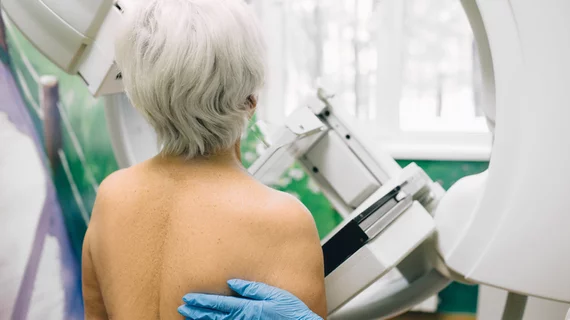Inpatient mammography screening scores high marks from formerly nonadherent patients
Johns Hopkins Medicine said it’s receiving rave reviews from formerly nonadherent patients imaged through a new inpatient mammography screening program.
More than one-third of hospitalized women are overdue for their breast cancer checkup, studies have found, with many at high risk of developing the disease. The Baltimore-based institution aimed to address this challenge, targeting women admitted for a general medicine service.
Nearly 80% agreed to undergo a mammography exam during their stay. All of those included said they were “extremely satisfied” with the experience, researchers reported in the American Journal of Preventive Medicine.
“The convenience of having screening mammography while hospitalized was reported to be a major facilitator of completing the overdue screening,” Waseem Khaliq, MD, with the Department of Medicine at Johns Hopkins Bayview Medical Center, and colleagues wrote July 4. “All nurses (100%) taking care of these women believed that this practice should become part of the standard of care, and most hospitalist physicians (66%) agreed that this practice is feasible.”
Hopkins providers conducted their prospective study among 101 nonadherent women (at least two years since their last mammogram) between the ages of 50-74. They collected data at the bedside, including family history of breast cancer and comorbidities, between 2015-2016 at Howard County General Hospital in Columbia, Maryland. About 29% of those included were Black, with an overall average age of 59. Out of 312 eligible individuals based on age, 39% refused to participate while 29% were discharged before a study coordinator could receive their consent.
All 101 women had health insurance, Khaliq et al. noted, but coverage remains an open question. But those involved see such inpatient screening as a crucial piece in the profession’s drive toward value.
“As hospitals move toward assimilation into accountable care organizations with high functioning electronic medical records, tests needed for preventive care should be made available to patients wherever and whenever they interact with healthcare system,” the research team concluded. “This attention to wellness promotion and disease prevention is especially meaningful for patients at the highest risk for illness and pathology.”

